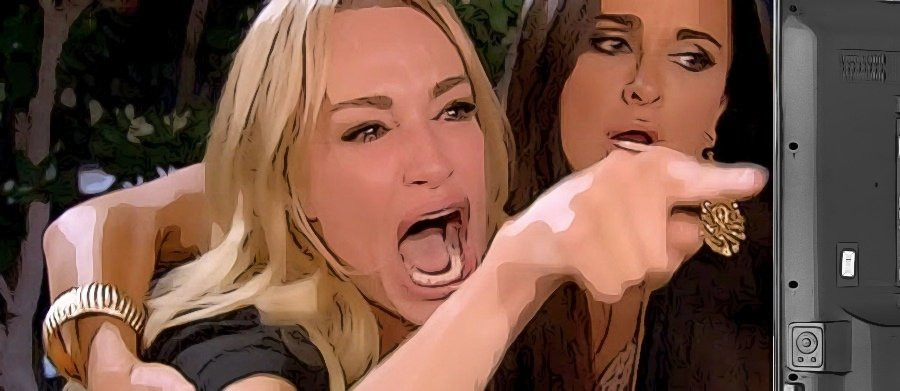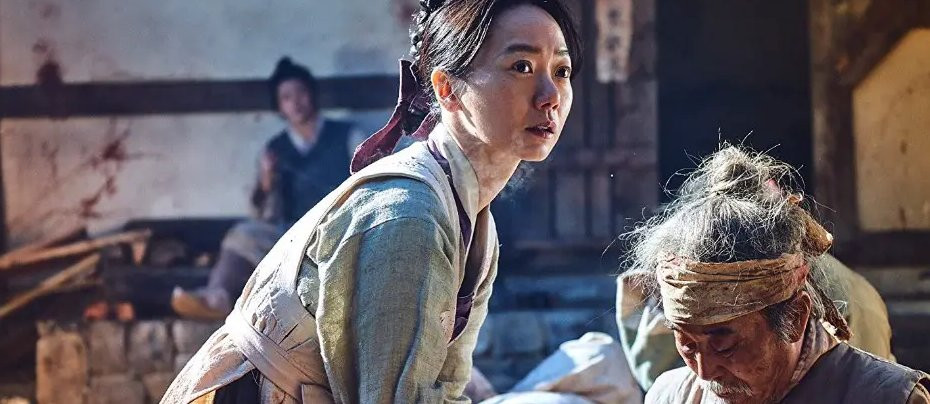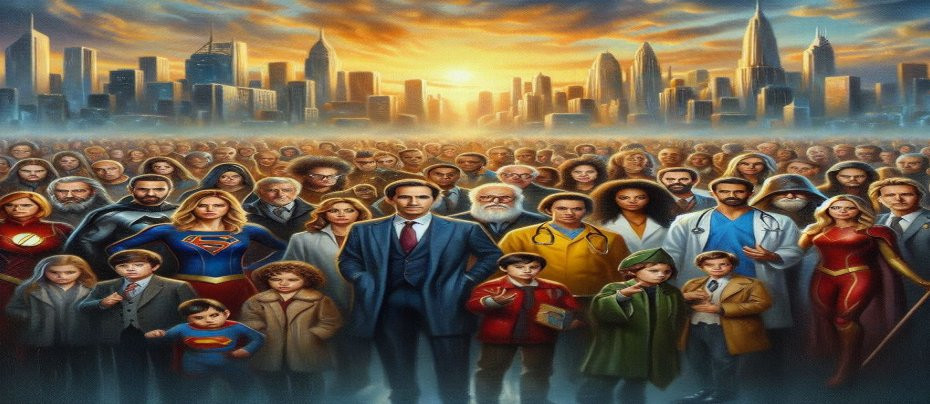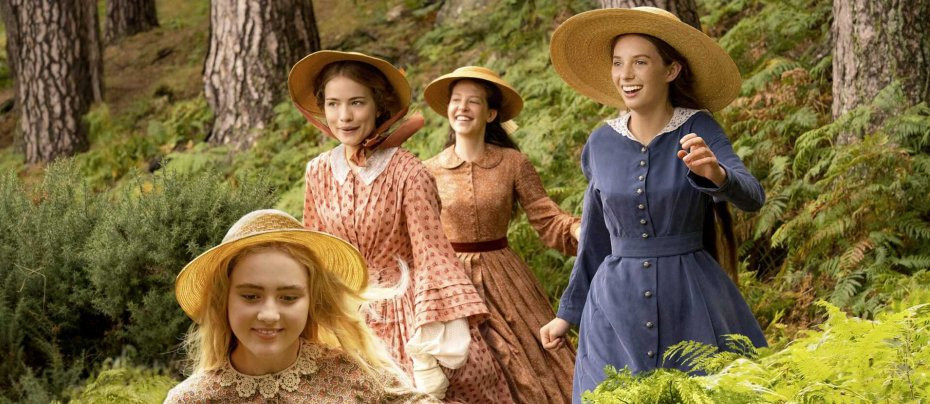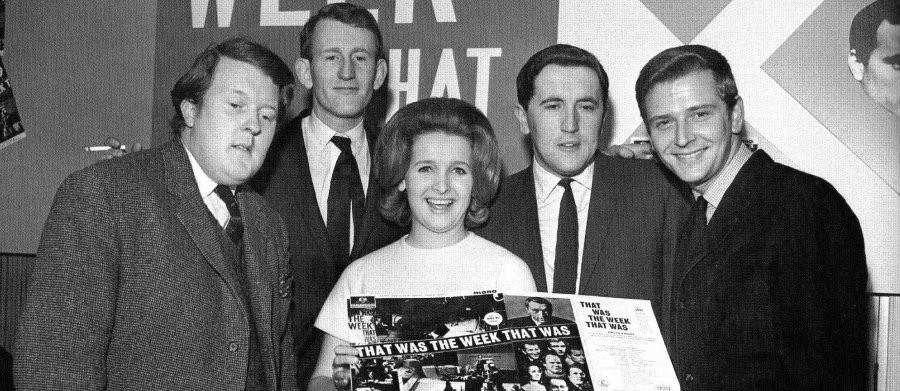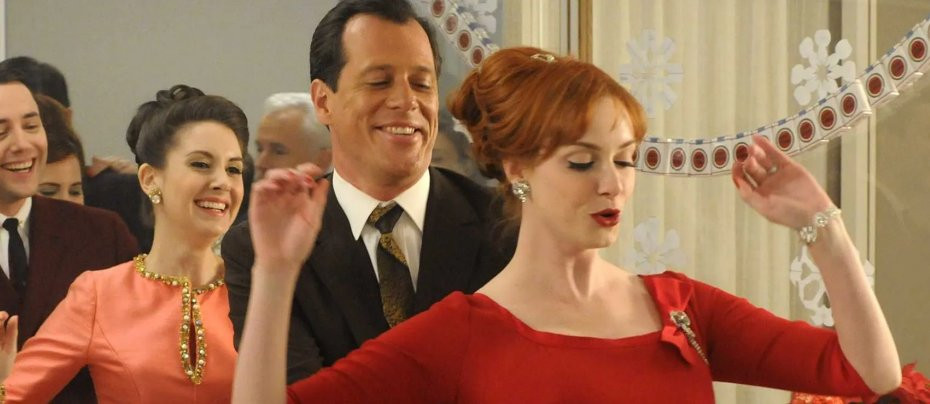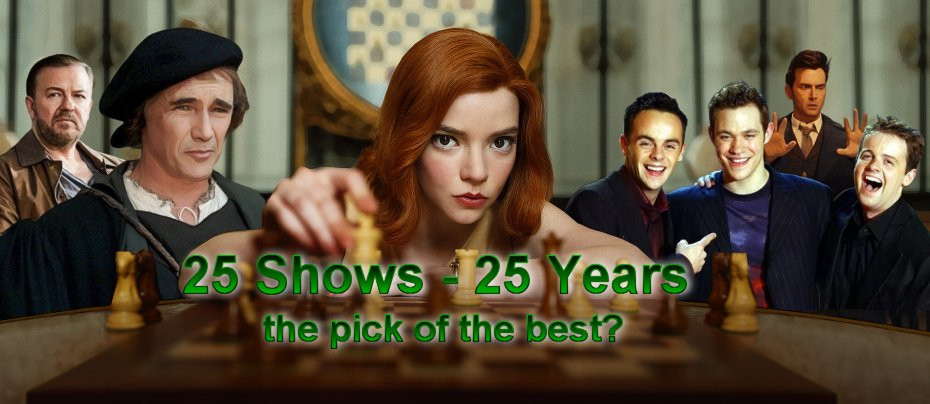
25 Shows in 25 Years
December 2024 marks Television Heaven’s 25th year on the Internet. The original concept was to review 20 TV shows that had each, in the writer's opinion, become a benchmark for quality television, been a game changer in certain story telling genres, or influenced programmes that followed it.
To mark this anniversary, I was curious to see if modern-day television still has the same influence over others as it had for the 44-year-old me way back in 1999. Does television still entertain? Does it still influence? Can it still change the way we think? To put those questions out for debate, I asked five of Television Heaven's regular contributors to choose five TV shows that, to them, were representative of the following categories: historical drama, comedy, modern drama, reality shows, science-fiction/fantasy. 25 shows over 25 years. My own choice, the five most important TV shows of the 21st Century, appear in a separate article. But for now, let's begin with:
Five Historical Dramas chosen by John Winterson Richards
Selecting the best five television historical dramas of the last twenty-five years was always going to be difficult, and so it was, but not for the expected reason, because it turns out that there a lot of good candidates and the hard part was deciding which to leave out.
The 21st Century has seen something of a revival of the television historical drama, meaning a drama supposedly based directly on historical events, as opposed to the historical romance or costume drama, which simply uses history as a backdrop and which never really went away. The success of the original Gladiator in the cinema was a factor in convincing producers that there was still demand for a genre that had been largely neglected in the Nineties while technological advances altered the equation on the supply side. The development of CGI in cinema and in video games enabled the historical epic to become truly epic even on a television budget. However, the price of this has been a blurring of the lines between history and fantasy.
The best example of both of these trends is Michael Hirst's truly epic Vikings. After a relatively intimate beginning it stretches technology to put huge armies, fleets, and cities convincingly on the small screen. Yet as a history of the real-life Viking warlord Ragnar Lodbrok and his family - who were themselves largely a matter of legend even in their time - the script's attitude to historical sources is erratic. This matters because there is enough accuracy in the production to encourage the viewer assume he is watching actual facts which makes it all the more misleading when it wanders off into fiction. Yet Hirst's approach has since become the norm. Although it is therefore not necessarily the best, Vikings is nevertheless the defining historical drama of the last quarter century and so deserves to be listed first.
Vikings is available on Netflix
There is case for saying that The Last Kingdom, which takes up the story of events in England in the aftermath of those depicted in Vikings, is superior as both history and drama, the two basic criteria by which historical drama should be judged. Based on a sequence of novels by Bernard Cornwell, it generally stays within the bounds established by historical sources, even if it does sometimes stretch them a bit. It also benefits from the fact that the protagonists are far more likeable than they are in Vikings, where almost everyone seems to be a psychopath.
(The Last Kingdom is available on Netflix)
Even better as both history and drama, Wolf Hall defies fashion by sticking closer to actual events and by relying on a rich physical production rather than CGI to evoke the past. Made by the BBC, it is a welcome throwback to the days from the late Sixties to the early Eighties when the Beeb were the uncontested world heavyweight champions of historical drama. In that tradition, it relies largely on its actors, led by Sir Mark Rylance as Henry VIII's "fixer" Thomas Cromwell. Since it is based on two well researched Booker Prize winning novels by Dame Hilary Mantel, it boasts far greater historical accuracy than most modern productions, even if it ought to be noted that it sees things from Cromwell's perspective and some historians might argue that Dame Hilary is sometimes a little too sympathetic towards her protagonist.
Wolf Hall is available on BBC iPlayer
Another production that relied less on CGI than on casting and old-fashioned production design was HBO's Rome. Its Historical Consultant admitted frankly that it aspired to authenticity rather than accuracy, and to that extent it succeeds. Although it features more than its share of big historical characters, including Julius Caesar, Pompey the Great, Cicero, Antony and Cleopatra, and Octavian, later Augustus, the first Princeps or Emperor in the modern sense of the word, they are viewed largely from the perspectives of those who looked up at them from below, most importantly two Centurions played by Kevin McKidd and the late Ray Stevenson. We therefore get to see the seedy underside of a great civilisation, which turns out to be the most fascinating aspect.
Rome is on Amazon Prime Video
It would be difficult to exclude any of those four productions from a list of the five best historical dramas of this Century so far, but this leaves only one vacancy for which there are several viable contenders. So before filling that fifth place, honourable mention should be made of some of the alternatives that were considered: Spartacus Blood and Sand, the first season of Black Sails, the second season of Knightfall, and the first season of The Great. The last in particular might have lived up to its name if it had limited itself to that one season as originally intended. This is a common problem with 21st Century historical drama, that it usually spreads its material too thinly among too many episodes and seasons. Given the high overheads in setting up a production that requires special sets, props, and costumes, as well as CGI, one can understand the economic necessity of getting as much value out of them as possible, but perhaps the BBC had it right back in its Golden Age of Historical Drama when they invested less in such things, relied more on writing and acting, and then quit while they were ahead.
That said, the final place in the Top Five goes to a show that relied heavily on its production values, Medici Masters of Florence. In fairness the writing and acting are also of a high quality, with substantial names on both sides of the camera, but what really sells it is the clever blending of location work with CGI to paint a beautiful landscape of Renaissance Italy.
This is the future of historical drama, and why historical drama looks to have a very exciting future. Yet that future will be even brighter when producers rediscover the truth understood by their predecessors in the Sixties, Seventies, and Eighties, that historical drama is most dramatic when it is most historical and viewers can be assured that what they are watching really did happen.
Medici Master of Florence is available on Netflix
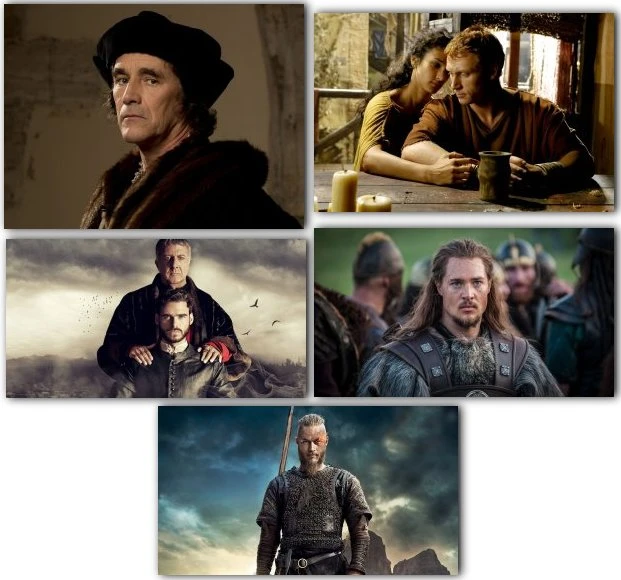
Five Comedies chosen by Brian Slade
Coming from an era when Fawlty Towers, Some Mothers Do ‘Ave ‘Em and Blackadder were securing vast viewing figures, it would be easy for me to bemoan the absence of great comedy over the last 25 years. In the 1970s and 1980s, with the onslaught of reality television still some way off, the main networks were happy to churn out sitcoms more regularly than dramas or soaps, and with the quality of such imports as Taxi, M*A*S*H and Cheers, scripted comedy was having a golden time.
In the multi-channel and streaming world there certainly seems to have been a watering down of quality, but there have still been some successes in the new millennium that have tickled me silly, reached parts other comedies haven’t reached and reminded me that if you look hard enough, there’s still good stuff to be found. So here, in no particular order, are the shows that have allowed me the most chuckles, warmed the heart and challenged my thinking.
In 2007, Ruth Jones and James Corden wrote a story of remarkable simplicity that captured the hearts of viewers across the UK. Having first appeared together in Fat Friends, the pair wrote Gavin and Stacey, a comedy about two young people who meet online before falling hopelessly in love on their first in-person meeting. The titular characters, played by Matthew Horne and Joanna Page, are the core of the story, but the success of the three series and the various Christmas specials was largely down to the strength of the supporting characters and the wonderful dose of realism in the writing.
As the pair’s best friends, Nessa and Smithy, Jones and Corden brought us not catchphrases, but entire monologues that resonated with their audience. Throw in Gav’s parents (Alison Steadman and Larry Lamb), Stacey’s Mum (Melanie Walters), her Uncle Bryn (Rob Brydon) and in the three series, the glorious neighbour Doris (scene-stealing Margaret John) and the cast is as close to perfection as a modern comedy could have boasted.
Eventually, we cared more about Nessa and Smithy’s misaligned love story than Gavin and Stacey’s, as evidenced by the clamour for closure in 2024, but in such a comparatively small number of episodes, we saw ourselves as we watched Smithy order his curry, Bryn make new technological discoveries 20 years late, Pam fake vegetarianism, and Gavin and Smithy karaoke to Do They Know It’s Christmas? while driving home. There’s a warmth that ran through this popular show that made audiences demand more, and thankfully Jones and Corden delivered the comfy Christmas blanket that the show and its audience deserved.
Gavin and Stacey is available on BBC iPlayer
Warmth isn’t perhaps the first thing that comes to mind on my second choice. There’s no doubting that for 99% of its existence, Friday Night Dinner was out and out wild, catchphrase-inducing slapstick situation comedy…and it was a blast.
Telling the story of a Jewish family who meet at the paternal home every Friday night for dinner, writer Robert Popper based the premise of the show on his own youth. The focus is on the Goodman family – mum and dad Jackie and Martin (Tamsin Greig and Paul Ritter) and their returning sons Adam and Jonny (Simon Bird and Tom Rosenthal). Stealing the show was their creepy but hysterical neighbour Jim (Mark Heap).
Friday Night Dinner doesn’t conjure up the same emotions as Gavin and Stacey. Aside from the death of Wilson, Jim’s faithful canine companion of whom Jim is unjustly terrified, there is rarely a serious moment. But perhaps that’s why it works so well. Jim’s relentless interruptions as he pines for Jackie, Martin’s ever-more bizarre quirks, the boys childish but hysterical physical and verbal fights – all are welcome escapes from heavy dramas. Throw in catfights between Grandma and Horrible Grandma (Francis Cuka and Rosalind Knight) and the hysterically deranged Mr Morris (Harry Landis) and you have the ultimate riot of chaos and conflict that allows a total escape from the harsh real world.
Friday Night Dinner is available on ITVX
During the lockdown years, dealing with the loss of a life you once had, became an all-too-common occurrence. Not all comedy has to be gunning for laugh-a-minute as Friday Night Dinner did. Some of the best comedy has to have a darker side and Ricky Gervais delivered just that when he brought us the black comedy After Life, in which he played Tony Johnson, a character struggling to come to terms with the loss of his wife at a young age.
Tony is a journalist on a local free newspaper. His brother-in-law runs the place, so struggles to deal with the new variant of Tony since Tony’s wife’s passing. He’s now angry with the world for what he’s lost, struggling to deal with anything and indeed but for his dog, would most likely have ended his days. His only real solace is a chance meeting with an elderly widow (Penelope Wilton) on the cemetery bench, who spends as much time talking to her deceased husband as Tony does to his wife.
After Life is probably Gervais at his finest. It would have been easy to add The Office as a top show of the last 25 years, primarily for the office life that so many of us can identify with. But After Life adds some depth to Ricky’s work and indeed his acting. It may have as many heart-breaking moments as it does comedic gold, but After Life hits a spot for any number of moods, and during lockdown it provided a balance between comedy and drama that clearly spoke to many.
Afterlife is available on Netflix
At the opposite end of the heart-strings spectrum came Peter Kay’s Car Share. Kay had already had us in hysterics with the antics of Brian Potter in Phoenix Nights, but in Car Share we got to see a warmer side.
As the title suggests, it tells the simple story of John (Kay), a worker at a fictional supermarket chain forced to participate in the company’s car-sharing scheme, and the bond he forms with his new passenger, Kayleigh (Sian Gibson). That, essentially, is Car Share in a nutshell. So simple it seems impossible to conjure a comedy from it, let alone one that became so successful. But Peter Kay tells stories like few others.
The format of the show – half the journey into work, the second half, the journey home – was part of the joy. It’s almost all filmed inside John’s car, quite an impressive achievement in itself. Instantly, we recognise the situation and identify with it. Who hasn’t given lifts to or from work to people who, initially at least, are colleagues rather than friends. The permanent company in Car Share is the soundtrack of fictional independent radio station Forever FM – again, recognition. Cheesy DJs, great 80s music and some truly awful adverts that are the exclusive rights of small commercial radio.
Peter Kay added a connecting tissue to Car Share that wasn’t in his previous success. While Phoenix Nights was extremely funny, we instantly liked and cared about John and Kayleigh, so it was no surprise that when the happy ever after wasn’t forthcoming at the end of the second series, fans were in uproar demanding a happier farewell, a request to which Kay duly obliged.
There are funnier shows than Peter Kay’s Car Share out there, but whether it’s the radio, the music, the format, the situation or the occasional quirky extra passenger, this show had something about it that just instantly endeared.
Watch Peter Kay's Car Share on BBC iPlayer
Finally, so as not to leave streaming and American comedy unrepresented comes The Good Place, for me one of the most imaginative and thought-provoking comedies to grace the small screen (even smaller screen if you streamed it on your mobile!)
Ted Danson is sitcom royalty…only the occasional hiccup has blotted his copybook, and The Good Place was him on top form as the architect of a neighbourhood in the afterlife’s Good Place, where Eleanor Shellstrop (Kristen Bell) has arrived even though she clearly doesn’t belong, having led a life of excess and selfishness on earth. For four series we are treated to twists and turns as she and her closest three pals in the afterlife try to learn how to be good.
If you aren’t going for the slapstick out-and-out comedy of something like Friday Night Dinner, something needs to reach the viewer. The Good Place did exactly that. There’s plenty of comedy, especially with the emergence of people from the Bad Place, and alongside Danson, D’arcy Carden steals a bucket load of scenes as Janet, an afterlife being solely in place to attend to the wellbeing of the neighbourhood’s inhabitants. But The Good Place offers more than laughs and asks the question, what does it mean to be good?
By the end of the final series, we’re left pondering our own behaviour. Is any good being done for the genuine goodness, or just to beef up our score in the afterlife? How indeed is it possible to be good – the suggestion that buying a tomato gets a negative score does indeed set you wondering whether your choices are actually as good as you think they are. My blueberries for tomorrow’s breakfast have been imported from Argentina – not such an ethical choice as it should be.
Some people may not like their comedy to ask questions of them, but The Good Place has it all – top notch performances, curve balls from all angles, a hysterical Stephen Merchant cameo, and plenty of ethical dilemmas. And if that’s not your cup of tea, Bad Janet offers a fine range in fart jokes!
So that’s my best five from the last 25 years. I doubt they will be yours. ‘Where’s The Office?’ will doubtless be a cry from many, but these five shows meant something to me. Heartstrings in places, absurd slapstick nonsense in others, but if we still lived in VHS days (look it up), the tapes of these ones would be wearing out big time.
Watch The Good Place on Netflix
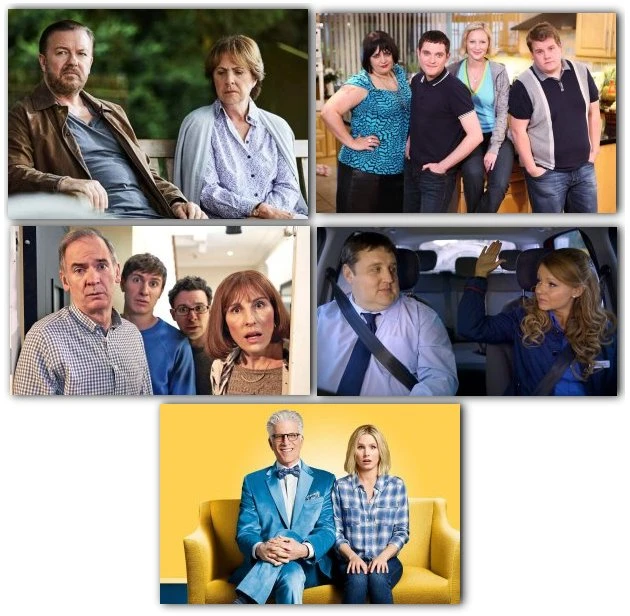
Five Modern Dramas chosen by Jennifer Ariesta (AJ)
Many TV shows can be great, not many can have enduring impacts beyond its time on the air. These five titles have proven that they are not only great TV series, they also have that extra juice that makes them the stuff of legend.
In her most dressed down role to date, Oscar winner Kate Winslet is ever luminous as Mare, a depressed small town police detective trying to solve a murder. The HBO production Mare of Easttown is an excellent whodunit. It begins like any typical murder mystery: a local girl with a promiscuous reputation is found dead by the river, prompting a gruff detective with messy private life to take action. What follows is a series of red herrings and sordid revelations about the sleepy town where the people seem too ordinary to commit heinous acts.
On paper, Mare of Easttown could easily be just like the many pulp crime dramas that came before it. In fact, its plot is pretty cut and dry when you actually break it all down. However, the miniseries ends up being a cut above the rest thanks to a sharp writing that enriches the story with memorable characters and compelling thematic repercussions surrounding the murder.
At its heart, Mare of Easttown is really about the woman and the town in the title. Both Mare and Easttown, the Pennsylvania town she presides over, are broken in so many concealed ways. The murder only serves as the knife cut that opens a Pandora’s box of unresolved situations. Supported by a score of stellar performances from the likes of Jean Smart and Evan Peters, Mare of Easttown redefines its genre by giving it a cerebral and emotionally rich dimension.
Mare of Easttown is available on Amazon Prime
Featuring the breakout performance of Anya Taylor-Joy as Beth Harmon, a chess prodigy with a troubled soul, The Queen’s Gambit pulled a surprise move and became one of the biggest streaming hits in the lockdown era.
The Netflix miniseries embodies the very definition of elegance. Every frame is utterly cinematic, with great attention to symbolisms. The depiction of 1960’s America where the series takes place is very vivid and detailed, from costumes, sets, to music. The visuals are not just good looking, it’s also carefully crafted to tell a story unto itself. From Beth’s chess-inspired wardrobe to the color of the paint mirroring her state of mind, it’s not just the writing that tells a story – everything in frame is part of the narrative.
All that works in favour of the coming of age story at the centre of it all, anchored by Taylor-Joy’s wonderfully flawed genius Beth. Rising from her orphanage beginning to the international stage of chess playing, Beth’s journey is nothing short of compelling. It might be muted in tone, but bursting with such a keen understanding of character arc that you just can’t help rooting for her. Yet, she’s also a woman of many vices, which adds to her dark allure. Taylor-Joy’s performance really balances it all: the naivete, the unbridled rebellious streak, the obsession.
This show makes chess sexy and dangerous – near unimaginable before – and creates one of the most layered character studies in recent memory in the process.
The Queen’s Gambit is available on Netflix
What’s particularly interesting about the story of a 1950’s housewife who divorces her cheating husband and becomes a comedienne?
Amy Sherman-Palladino and her husband Daniel Palladino truly created something magical with the Amazon Prime series The Marvelous Mrs. Maisel. They brought their trademark a-mile-a-minute dialogues – made famous by their previous TV classic Gilmore Girls – and applied it to a period story of female liberation based partly on the life of iconic comedian Joan Rivers. The result is a comedy series with exuberant wit and heartfelt characters all around, anchored by a pitch perfect comedy ensemble led by Rachel Brosnahan as Midge Maisel and Alex Borstein as Susie Myerson.
In addition, thank heavens for Amazon’s budget, because this show is just so sumptuous to look at. Every episode is like a 1950’s Technicolor musical brought to life, with vibrant recreation of period details and mise-en-scenes that could put big budget films to shame. You can literally pause any scene and notice quirky details in the background. This can easily look gimmicky in the wrong hands, but the Sherman-Palladinos’ deft understanding of this world they created, this version of Midge’s New York City, only serves to enhance the empowering fantasy.
The Marvelous Mrs. Maisel proves that comedy should never be limited to sitcom boxy sets or mid-budget productions that they are typically given. This series shows that just like dramas, comedies can have epic scale given the budget and creative liberty to match.
The Marvelous Mrs. Maisel is available on Amazon Prime Video
Downton Abbey is the series that launched a thousand upstairs-downstairs period dramas, reviving a dying genre in the process.
Back when it first debuted, the aristocrat-servant dynamics so integral to the drama was considered a thing of the past. Creator Julian Fellowes, with his encyclopaedic knowledge on British aristocratic history, injected a renewed energy into the stuffy topic and created a worldwide phenomenon.
The plot follows the households living and serving at the titular estate at the beginning of the 20th century. There is a crisis of inheritance as the Crawleys, the landed gentry owning Downton, has no male heir. And so, their fierce eldest daughter Mary must haste for a husband lest the family loses their prestigious way of life. Perhaps it was a potent mix of good product and perfect timing, audiences quickly embraced the nostalgic charm of the bygone era offered by Downton Abbey.
Indeed, there is something utterly beguiling about the show’s reverence for traditional English custom. Fellowes’ attention to period-appropriate details is legendary and the character dynamics, though soap opera-ish in nature, really come to life thanks to the stable of homegrown thespians – largely unknown then except for the late, great Dame Maggie Smith – filling the cast from top to bottom.
There is simply no other way to describe it other than “unapologetically escapist” - which is perhaps exactly what people need during the harshness of modern life.
Downton Abbey is on ITVX
Yet another lockdown massive hit, Bridgerton completely rewrites the rulebook of period romance, which was previously dominated by conventional classics derived from the works of Jane Austen and The Bronte Sisters.
The show, produced by Scandal and Grey’s Anatomy creator Shonda Rhimes based on Julia Quinn‘s series of novels, upends every Regency romance convention. It popularizes things like period drama blind casting, bodice ripper-esque sexual tension, and the contemporizing of music and character sensibility. Purists might find these changes ghastly, but what Bridgerton did opens up the genre to a whole new audience who, it turns out, are yearning for a fresh take on period romance.
While the plot of the show - which focuses on a different member of the aristocratic Bridgerton family every season - can be a hit or miss, one cannot deny the impact that its snazzy aesthetic and vibe has on the entire genre.
Bridgerton is on Netflix
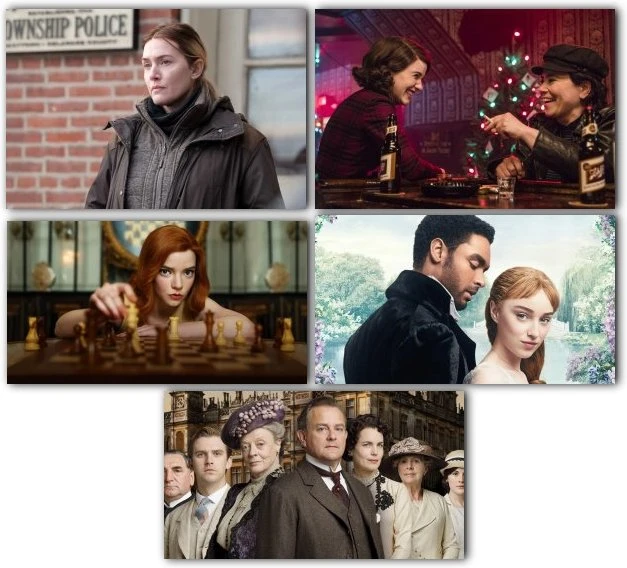
Five Reality Shows chosen by Sunday Summers
Humans are, by and large, voyeuristic creatures, which is likely why reality television is such a popular genre. And if A Life of Grime is anything to go by, we even like having a peek into the grossest aspects of some people’s lives. Airing on the BBC in April 1999, A Life of Grime (a play on words for A Life of Crime), was the first reality show of its kind to poke around the dankest, grimiest homes in the UK. It spawned many like it over the years, including many, MANY YouTube videos of the same ilk, but this show did it first at the very start of the reality show explosion.
Following the exploits of environmental health officers in different locations around the UK, this vividly gross, often astounding, and sometimes heart-breaking series was narrated by Radio One DJ John Peel, and later in the series by alternative comedian and writer, Arthur Smith. From the eccentric to the downright filthy, to more serious and sad stories of the complex issues surrounding hoarding, A Life of Grime pulled no punches, and for me it’s a cracker of a reality show that wasn’t afraid to shock its viewers.
A format that has now been done to death the world over, Pop Idol was the first of its kind to showcase brilliant young talent with the dangled carrot of a mega recording contract and global fame. This reality series first aired on ITV in December 2001, after months of auditions spanning the entire country, with the grand final broadcast in February 2002. I’m just about old enough to remember repeats of New Faces and Opportunity Knocks from back in the mists of time, but Pop Idol was on a whole other level.
The premise was simple but brilliant – open up UK wide auditions to 18 to 25-year-old hopefuls, televise the sometimes hilarious content, and have a panel of judges calling the shots - namely record executive Simon Cowell, DJ Neil Fox, producer Pete Waterman, and PR agent Nicky Chapman. Pick a couple of likable presenters in the form of Ant and Dec, and what you have is the monopoly of prime time, Saturday night viewing. The entire country went Pop Idol mad, and thus a reality show classic was born.
Selected episodes of Pop Idol can be found on YouTube
An unusual reality show, but one that terrified and captured the imaginations of the country, Most Haunted aired on Living TV in 2002, and has since spawned countless copycats and a revival over the last twenty odd years. Presented by Blue Peter’s Yvette Fielding, this paranormal reality show followed investigators of the spooky and supernatural as they visited some of the UK’s most haunted places. Featuring a demonologist and historian, a cynic, a medium, and a couple of parapsychologists, this show was Ghostbusters without the proton packs.
Pubs, hotels, castles, homes, hospitals, prisons, you name it, the crew of paranormal investigators took their equipment along to seek proof of ghosts, possessions, and poltergeists in a bid to convince the sceptics, and titillate the believers. I loved it! And so did the army of viewers that helped it become one of the longest running reality shows the UK has ever had, boasting a whopping 25 seasons. Was it real? Who knows. Was it immensely captivating? Absolutely. There were complaints that former medium and psychic Derek Acorah had faked being possessed, which was ultimately overturned by OFCOM due to Most Haunted primarily being an entertainment series. Regardless of controversy, this show was one of a kind when it was first broadcast, and deserving of its place on my list of outstanding realist shows.
Most Haunted can be found on YouTube
Surrounded by controversy and calls for it to be pulled off air due to outrage over its premise and worries of special needs people being exploited for entertainment purposes, The Undateables first aired on Channel 4 in 2012. The ironic title was dig at those who think someone with a disability wouldn’t, couldn’t, or even shouldn’t date, a fact that seems to have been lost on those who lodged complaints. . Blowing this preposterous mentality out of the water, the show had bags of humour and heart, without ever feeling like the daters were having fun poked at them.
The Undateables followed the trials and tribulations of dating hopefuls with long term health conditions, including severe earning difficulties, neurodivergence, and physical disabilities as they dipped their toe into the dating pool thanks to the dating agency ‘Flame’. This reality show was truly ground-breaking, somewhat brave, but always heart-warming as viewers got to know the amazing, fun-filled people on their quest for love. Exploding the myth that people with long term health conditions are ‘undateable’, this show is an absolute one of a kind.
The Undateables can be streamed on channel4.com
Rounding off on a humorous one, Naked Attraction bagged itself a massive amount of controversy and complaints when it aired on Channel 4 in 2016 – and yet it ran for 7 seasons nonetheless. Yes, it’s another dating reality show, but ‘bare’ (sorry) with me, because when it comes to reality, nothing is more real than standing around in your birthday suit – we can only hope they kept the studio warm!
About as far removed from Cilla’s Blind Date as is humanly possible, the premise for Naked Attraction was simple. Six contestants stand stark naked in front of one fully dressed contestant, who then has to choose which one to take on a date. Presumably, depending on how well they got on, clothing was optional at that point! Despite fielding complaints of full frontal nudity – the clue is in the title – it’s such a fun show, and nothing like it had ever been attempted before. Despite some people’s prudish reactions, it went on to spawn a handful of European spin-offs, although didn’t fare too well in the States, with the show being pulled off the air pretty sharpish amidst calls of it being too ‘sexual’ for viewers. Ooh err, missus!
Naked Attraction can be streamed on channel4.com
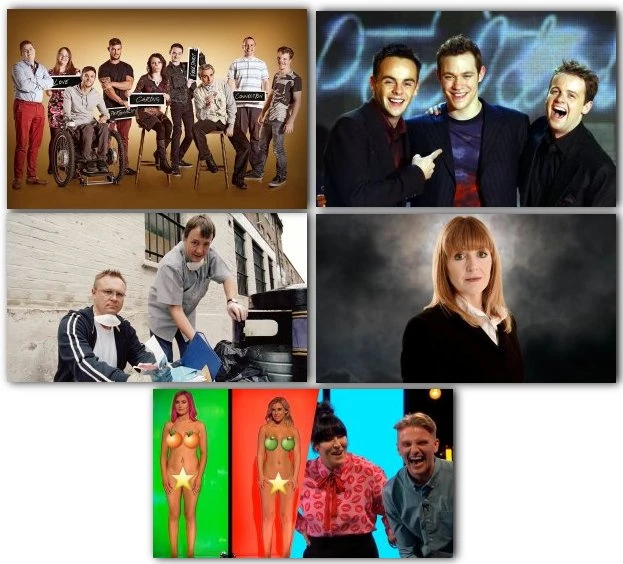
Five Sci-Fi/Fantasy Shows chosen by Daniel Tessier
Science fiction and fantasy have been a prominent part of television drama since its beginnings, and now, in the 21st century – once the archetypal setting for sci-fi stories – they're more popular than ever. Both sci-fi and fantasy are notoriously hard concepts to define, and overlap with each other, along with other genres such as horror, thriller, comedy, satire and romance. In fact, virtually anything that is somehow beyond the mundane could be classed as either or both sci-fi or fantasy.
So how do we decide what programmes count as sci-fi and fantasy, let alone which are the most significant, entertaining and impactful examples? Good sci-fi and fantasy must be something that sparks our curiosity in what could come to pass, and our captivation in what could never happen. More than this, though, the best examples, whether set forwards, backwards or sideways in time, reflect the concerns of our world now, finding a new and creative way to explore them.
Below are five of the most inventive, mindbending, vividly realised worlds on TV, and while they are all remarkably different in style and content, they all share the intelligence, imagination and downright strangeness that marks sci-fi and fantasy at their best.
Anthology series have long been one of the most successful formats for science fiction television, allowing creators to present dozens of possible worlds and futures in a single programme. Charlie Brooker's Black Mirror is the best modern series to take this approach, exploring humanity's increasingly complex relationship with technology, and using it to reveal the darker sides of our society. From humble origins as a three-episode series broadcast on Channel 4, Black Mirror developed into a phenomenon, moving to Netflix and high-budget international production. Currently at 28 episodes over six series (including two specials), Black Mirror has shown us disturbing visions of the future, many worryingly plausible. Indeed, Brooker has an alarming knack for predicting the most unlikely events – who can forget David Cameron and PigGate, foreshadowed five years earlier by the very first episode, “The National Anthem?”
Each episode boasts an impressive cast, from its early days of respected actors and future stars on the verge of breaking out, to established Hollywood megastars including Bryce Dallas Howard and Salma Hayek. The various episodes play with different genres, from satire and black comedy of Nosedive and Joan is Awful, to the truly dark dystopias of White Bear and Black Museum. Recent episodes have even moved away from the sci-fi core of the series to involve supernatural elements and outright horror. Identity, morality and humanity are explored, usually with the bleakest of conclusions. However, there are a select few episodes with happy endings, such as the romantic standout San Junipero, that show some hope in both people and technology. The series has even been on the forefront of technical progress itself, with the interactive, “Choose Your Own Adventure” style special Bandersnatch. A seventh series has just been announced.
Black Mirror can be streamed on Netflix. The later seasons are available on Apple TV and Amazon Prime Video for purchase.
One of the longest running and most beloved series of the twentieth century, Doctor Who was considered old hat when Russell T. Davies revamped and revived it for the twenty-first. That first series starring Christopher Eccleston and Billie Piper was a rousing success for the BBC, proving that there was still a place for fun drama for all the family on a Saturday night. Over the course of fourteen series, the modern Doctor Who has kept changing, constantly reinventing itself around its central conceit: a mysterious alien having adventures in a time-and-space machine outwardly shaped like an old British police box. After Eccleston's short run as the Doctor, David Tennant took the series to new heights of popularity, after which Steven Moffat took over as showrunner and cast Matt Smith as the new Doctor, reaching greater international success.
Peter Capaldi's run saw a return to the older, more severe Doctor of the programme's earliest days, before Jodie Whittaker became the first woman to lead the show, under short-tenured showrunner Chris Chibnall. Not all of Doctor Who's regenerations have been as successful as others, and waning popularity by the 2020s led to Davies and Tennant both returning, the latter only briefly. Now Ncuti Gatwa heads the series as its first Black British lead, the show once more reinvented for a core audience of viewers who were scarcely born when Eccleston first stepped out of the TARDIS. While it's stoked plenty of controversy among the die-hards, each era of the series has its loyal fans, as Doctor Who continues to capture the imaginations of generation after generation.
Doctor Who can now be streamed on BBC iPlayer in the UK, and on Disney Plus elsewhere in the world.
Joss Whedon's TV series could dominate a list like this, but if there's one that stands out as a must-see, it's Firefly. A space western – a genre rarely visited this side of the 1980s – Firefly follows a ragtag crew of former soldiers, ne'er-do-wells and fugitives as they scrape together a living on the frontier. Having abandoned the Earth, humankind has now colonised a vast and complex star system, under the control of the totalitarian Alliance. Out on the edge of the system, among the sparsely populated dustbowl moons, Alliance influence is weak – the perfect place for the crew of the Firefly-class ship Serenity to take jobs that are often on the wrong side of the law.
Nathan Fillion makes for a magnetic lead as Captain Mal Reynolds, who, along with his trusted number one Zoe (Gina Torres), were on the losing side in a civil war against the Alliance. Summer Glau, then new to acting, captivates as River Tam, a troubled but brilliant young woman.
Whedon created a rich and beautifully realised future universe, full of incredible advances and palpable horrors, but it's the characters, awkwardly working together to stay alive and free, that make the show so watchable. Network execs at Fox cancelled the series after only eleven episodes had been broadcast and only fourteen filmed; the series achieved a following through word-of-mouth and impressive DVD sales. While Firefly never got to explore its future as it should have, fans did at least get closure through the excellent film follow-up Serenity.
Firefly can be streamed on Disney Plus. It is also available on Apple TV and Amazon Prime Video for purchase.
A spiritual successor to The X-Files, Fringe played with many of the same ideas and techniques: agents for a special department of the FBI investigate bizarre happenings, solving each mystery-of-the-week while unearthing a deeper and more sinister truth. Fringe, however, beat The X-Files at its own game, with concepts that were more fantastic, mysteries more intriguing, and a mythology more complex than its predecessor. Also taking cues from series including Lost and The Twilight Zone, and films such as Altered States, creators Robert Orci, Alex Kurtzman and J.J. Abrams crafted a series that became the ultimate in paranormal detective shows.
Centring around Anna Torv as the gifted, driven, but isolated and troubled Agent Olivia Dunham, and Joshua Jackson as the roguish yet brilliant chancer Peter Bishop, Fringe's biggest asset was John Noble. As Walter Bishop, Peter's father, Noble gave a moving and mercurial performance as a groundbreaking genius who was nonetheless mentally ill and frequently helpless.
Playing with concepts labelled “fringe science,” from telepathy, psychokinesis, and genetic experimentation, to time travel and the manipulation of reality, Fringe's writers gradually revealed an intricate mythology over five seasons. Complex though it was, involving both a parallel universe and an implacable foe from the future, the backstory was carefully and creatively revealed, all while providing riveting standalone episodes. The series even managed that rarest of things: a satisfying ending.
Fringe can currently be streamed on ITVX in the UK. It is also available on Apple TV and Amazon Prime Video for purchase.
One of Netflix's crown jewels and a shining example of prestige television, Stranger Things is a love letter to the science fiction and horror genres. Showrunners Matt and Ross Duffer crafted Stranger Things as a nostalgic fantasy of the 1980s (in spite of only being five when the decade ended), calling back to the works of Stephen Spielberg, Stephen King, Joe Dante and John Carpenter among others. Fans of the genre can enjoy spotting references, of course, but the Duffers have created a gripping and inventive reality where the everyday and the unearthly come into brutal collision.
As with so many of the best sci-fi series, though, it's the cast and characters who make Stranger Things such a pleasure. For nothing else, we must thank the Duffers and their team for discovering Millie Bobby Brown, who, as Eleven, has matured from a remarkably powerful child actor to a leading lady. Beginning as a mystery to be solved, Eleven appears out of nowhere, escaping from a cruel world of experimentation and displaying incredible powers. She goes on to become the heroine at the centre of the series. With an expansive cast that also includes Winona Ryder, David Harbour, and breakout stars Sadie Sink, Joe Keery, Finn Wolfhard and Maya Hawke, there's a rich community within Hawkins, Indiana that viewers come to feel part of.
Stranger Things, which will reach its fifth and final season next year, presents one of the most genuinely terrifying supernatural threats ever to haunt the small screen. Yet, at its heart, it's a coming-of-age story about balancing friendship with the challenges of adult life, as the characters have grown up with the cast.
Stranger Things is available to stream exclusively on Netflix.
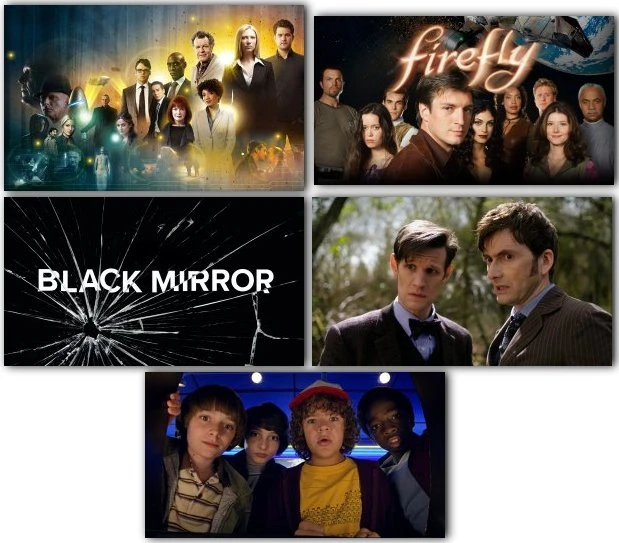
And there you have it – our writers' carefully curated list of 25 television shows that have undeniably shaped our cultural landscape, whether for better or worse, from 1999 to 2024. While there's no such thing as a universally "right" or "wrong" list, the truth is that personal preferences reign supreme. Is this Television Heaven, or Television Hell? Ultimately, the verdict is entirely yours to decide.
(LM – 05/12/2024)
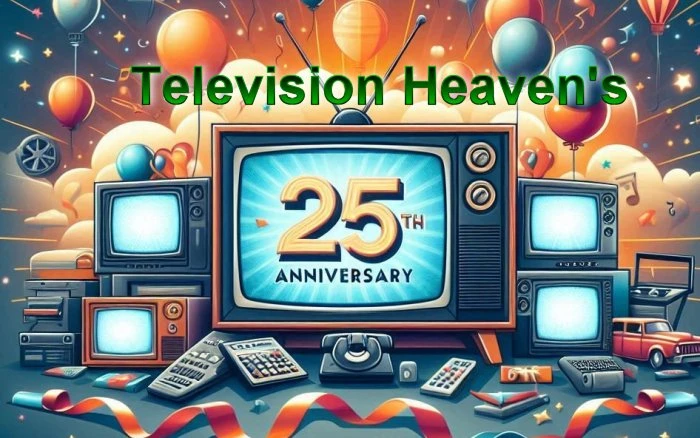
Published on December 5th, 2024. Written by the writers as shown above for Television Heaven.


